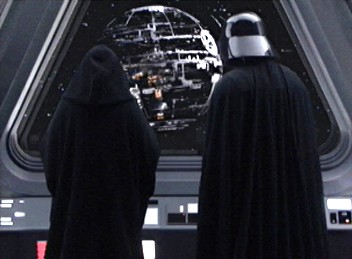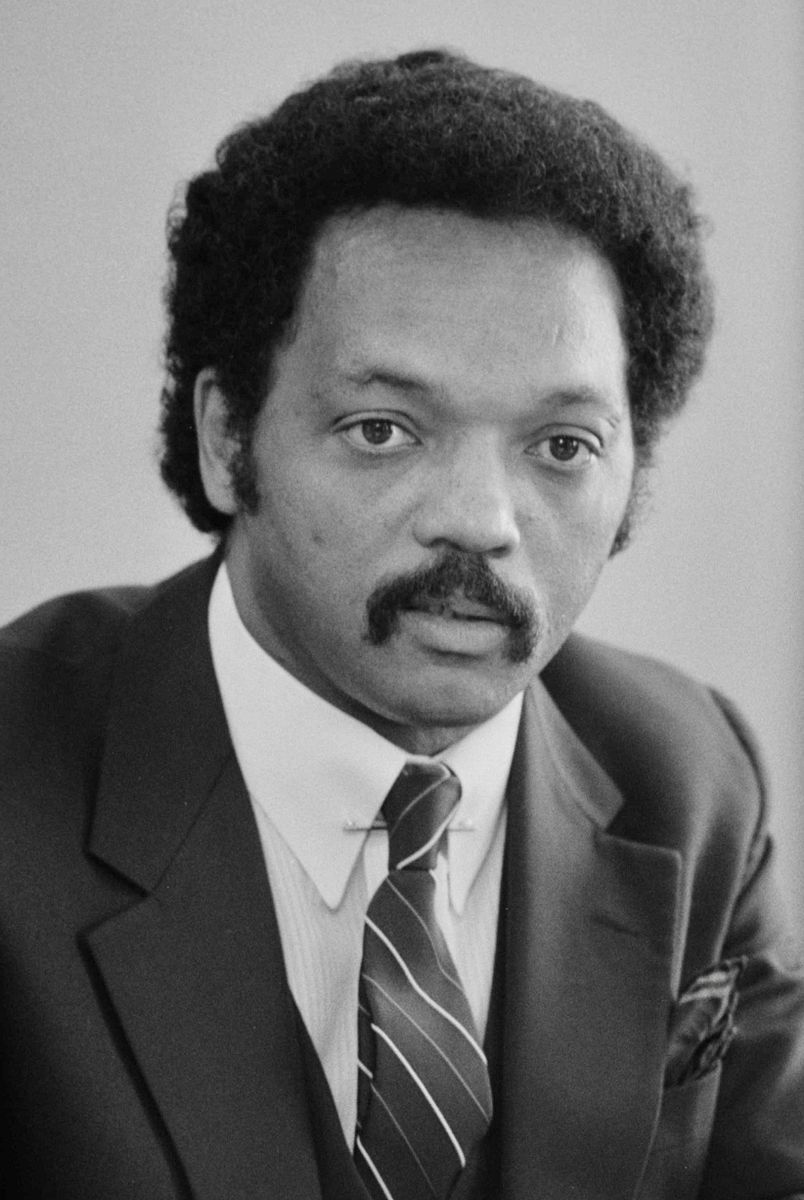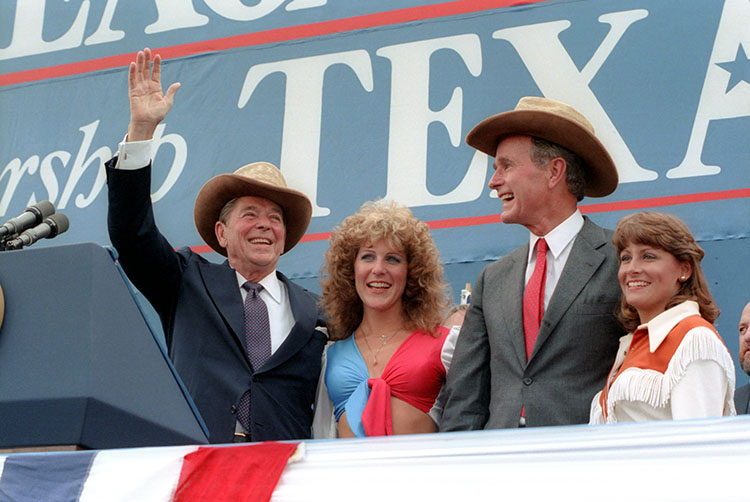

Was America great again? Under President Ronald Reagan, the economy was improving, the Commies were losing, and there were no negative repercussions in sight! Could any Democrat take him down?
The Last Four Years
Thanks to the release of the Iran hostages on Inauguration Day, Reagan was able to focus on the economy right away. The keys to his plan were tax reduction and budget cuts. His administration predicted that reduced government interference in people’s lives would stimulate the sluggish economy. Reagan’s belief that cutting taxes for the wealthy would lead to greater growth overall was known as supply-side economics, trickle-down economics, Reagan-omics, and (to his primary opponent, turned vice president, George HW Bush) voodoo economics. The main targets of reduced spending were the social programs of Lyndon Johnson’s Great Society. Expensive, but enormously popular, programs like Social Security and Medicare were spared. These policies, paired with a contradictory surge in defense spending, greatly increased the deficit. Supporters argued that an improved economy would compensate for the losses by expanding the tax base. Surprisingly, Reagan worked closely with Congressional Democrats, led by House Speaker Tip O’Neill, to pass his agenda. Moderate Democrats proved easy to pressure as Reagan won many of their districts in 1980. As a compromise, he promised not to campaign against any Democrat who voted for his economic bills in the 1982 midterm elections. Unfortunately for Reagan, Congress didn’t exactly deliver on his request to reduce spending. Both parties added pet projects that only deepened the deficit.

On March 30, 1981, Reagan was the target of an assassination attempt outside of a hotel in Washington, DC. The shooter, John Hinckley Jr., hoped to impress actress Jodi Foster, who he stalked after watching the movie, Taxi Driver. Hinckley fired several shots as the President, one hitting him in the chest. Press Secretary James Brady, a Secret Service Agent, and a police officer were also injured. Reagan was rushed to a hospital, where he told surgeons, “I hope you are all Republicans.” The bullet missed his heart by less than an inch. All of the victims survived, although Brady suffered brain damage and was permanently disabled. He went on to become a major gun control advocate. The outpouring of support by the American public helped pass Reagan’s economic plan. The final bills included a 25% tax reduction over three years and $38 billion in budget cuts.
The less flashy side of Reagan’s economic plan regarded the Federal Reserve’s monetary policy. Since the Fed can act without Congressional approval, their actions received less media attention than the tax and budget cuts. They aimed to bring inflation under control by tightening the nation’s money supply with high interest rates. This policy hurt small businesses and the middle class, but the supporters believed these were necessary sacrifices. Initially, the high interest rates and deficit caused a recession. The ensuing rise in unemployment caused Reagan’s popularity to drop. Republican leaders, worried about the midterm elections, urged Reagan to break with the Fed, but he insisted on “staying the course.” His gamble paid off. Reduced inflation brought an economic boom in 1983 that was sustained for the rest of Reagan’s time in office. Unemployment dropped, inflation was controlled, interest rates were lowered, and the stock market soared. Reagan’s supporters were eager to credit his conservative policies, but the economic reversal was also brought on by tax increases and a relaxation of Fed policy in 1982, plus the added boost of military spending. The Reagan Boom raised more people out of poverty than any similar boom since WWII, but not all Americans benefitted equally. While the annual income for American families grew by 3.5% during Reagan’s first term, that number was only 1% for the middle class, 9% for the wealthy, and an 8% decrease for the lower class. African Americans and single-parent women were hurt the most. Additionally, Reagan never did pass a balanced budget. During his time in office, the national debt increased from $914 billion to $2.5 trillion. Military spending remained high, but Republicans argued the Cold War counted as “wartime” spending.
Unlike his immediate predecessors, Reagan took a tough stance against Communism. He believed that the Soviet Union had taken advantage of Nixon’s détente and Carter’s SALT II treaty (which was never actually ratified by Congress). He no longer asked for cooperation and instead called Soviets evil, using lines such as, “the West won’t contain Communism, it will transcend Communism.” Reagan argued that the Russian economy was weaker than most experts believed and that escalating the arms race would force them to bargain. Defense spending was exempt from Reagan’s otherwise conservative economic policy. He oversaw the largest peacetime military budget of all time. This allowed the military to modernize their equipment and invest in research and development, which helped stimulate the economy. It also boosted American confidence, something that had been lagging since the 1960s. Tensions remained tense between the superpowers throughout Reagan’s term. Several close calls could have easily led to nuclear war, like when a Korean Airlines passenger plane was shot down after drifting off-course into Russian territory (the incident prompted Reagan to allow public use of GPS). The capstone of Reagan’s defense plan was a satellite-controlled missile shield called the Strategic Defense Initiative, disparagingly known as “Star Wars.” It was a grand vision, though its feasibility was questionable from the beginning.

Major Issues
It felt like America was finally winning again! That said, Reagan’s economic policies mostly benefitted the wealthy and unfairly hurt the poor. The rising national debt would surely be a problem for future administrations. Reagan’s defense spending was out of control and tensions with the USSR were on the rise.
Party Watch
Eight candidates sought the Democratic nomination, but only three won state primaries: former Vice President Walter Mondale of Minnesota, Colorado Senator Gary Hart, and civil rights activist Jesse Jackson (the most successful African American candidate so far). With a liberal platform, Jackson hoped to create a “Rainbow Coalition” of minority groups and progressives. His support with African Americans, who had become one of the most important constituencies of the Democratic Party, helped him win five states and prove that he was more than a fringe candidate. His campaign stalled, however, partly due to disparaging remarks he made toward Jewish New Yorkers. He placed third in the primaries, with 21% of the primary popular vote, but argued that the party rules hurt him, as he was only awarded 9% of the delegates. Senator Hart was most popular with Yuppies (young, urban professionals), who were drawn to his platform of liberal policies paired with an emphasis on economic growth. He criticized the old establishment and promised an agenda of “New Ideas.” He was embarrassed in a primary debate when Mondale said his vague platform reminded him of a Wendy’s commercial, “Where’s the beef?” Vice President Mondale, the early favorite with establishment support, slowly pulled away with the delegate lead, but ended about 40 votes short of an outright win. Luckily, the unelected superdelegates at the convention overwhelmingly supported him, granting him the nomination. This was the last instance in which a major party’s nomination remained undecided all the way until its convention. Sensing the need for excitement in order to defeat President Reagan, Mondale selected New York Congresswoman Geraldine Ferraro as his running mate, the first female candidate on a major party’s ticket.



The Republican nomination was a no-brainer. President Ronald Reagan and Vice President George HW Bush faced no serious opposition in the primaries. Theirs was the only nomination in history in which the presidential and vice-presidential roll calls were taken simultaneously at the convention. In his acceptance speech, Reagan celebrated church, home, country, and morality; values he accused the Democrats of abandoning.
The Campaign
A Reagan victory seemed inevitable, but Mondale managed to raise some worthwhile concerns about the incumbent president. Both candidates invoked the 1948 campaign of Harry Truman. Mondale reminded voters of Truman’s upset victory over Republican Thomas E. Dewey, the clear polling favorite. In order to attract Democratic voters, Reagan recreated Truman’s whistle-stop tour of ohio, even using the same train.

Reagan’s age was a major cause for concern. So far, the oldest president to leave office was 70-year-old Dwight Eisenhower. If re-elected, Reagan would be almost 78 at the end of his second term. Rumors spread that he was falling asleep in cabinet meetings. Reagan, of course, responded with his trademark humor. When visiting overworked campaign staffers in DC, he joked, “If I could manage it, I would schedule a cabinet meeting so that we could all go over and take a nap together.” But two moments kept the issue at the forefront of voters’ minds. In August, when a reporter asked him about arms-control agreements, Reagan appeared dazed and confused until First Lady Nancy whispered to him, “Doing everything we can.” He woke up and repeated the phrase verbatim. Additionally, Reagan struggled during the first debate in October. At one point, his mind seemed to go blank and his closing arguments were rambling and confusing. Reagan’s team blamed the performance on poor coaching. His performance improved in the second debate, delivering one of his most famous one-liners: “I’m not going to exploit, for political purposes, my opponent’s youth and inexperience.” Even Mondale couldn’t help from laughing. Reagan used his presidential duties to appear more vigorous. In 1984, he traveled to China, Europe, the World’s Fair in New Orleans, and the Summer Olympics in Los Angeles.
Reagan and Mondale had heated arguments over religious issues, such as abortion, prayer in public schools, and tax credits for families with children in parochial schools. Reagan often used religious imagery in speeches and criticized “modern-day secularism.” At a prayer breakfast in Dallas, he said, “The truth is, politics and morality are inseparable. And as morality’s foundation is religion, religion and politics are necessarily related.” He also claimed that opponents of prayer in public schools were “intolerant of religion.” Mondale, the son of a Methodist minister, was offended by Reagan’s remarks. Against the recommendation of his advisors, he attempted to make religion a major issue. Reagan was forced to backtrack on his statements and reaffirm that he supported the separation of church and state, but the issue never truly gained traction with the public.
One of Mondale’s biggest targets was Reagan’s economic policies, specifically the budget deficit. Mondale made the ill-advised promise to raise taxes. He believed that, by taking the unpopular position, he would impress voters with his leadership abilities (what the f*ck are you doing, man?!). He played right into Reagan’s hands. The President easily labeled Democrats as heavy taxers and spenders who were overloading the country with debt before he took office. He warned Americans that “high taxes, sugar-coated with compassionate rhetoric is a disaster in disguise that will destroy our economic expansion, increase unemployment, and re-ignite inflation.” In another speech, he joked, “I was about to say to him very sternly, ‘Mr. Mondale, you are taxing my patience.’ And then I caught myself. Why should I give him another idea? That’s the only tax he hasn’t thought about!” Reagan ignored his own deficit and boasted about the improving economy. He dismissed Mondale’s criticisms as pessimism. This argument extended to foreign policy, as well. He called Democrats the “blame American first” party. Mondale’s arguments against Reagan’s hawkishness never registered with voters. Reagan eventually ended the issue by calling for arms control negotiations with Russia.
Election Day

It was another Reagan blowout. Mondale only won his home state of Minnesota and the Democratic stronghold of the District of Columbia. Notably, he only won Minnesota by 3,761 votes. Reagan continued to dominate across the country. He took one-fifth of the Democratic vote. Those who flipped were known as Reagan Democrats.
The Winner
President Ronald Reagan won a second term! His 525 electoral votes (against Mondale’s 13) are the most of all time. He narrowly beat Franklin Roosevelt’s 1936 total, though his opponent, Alf Landon, still held the lowest score with 8. Reagan won 58.8% percent of the popular vote, falling behind the records set by Lyndon Johnson, Franklin Roosevelt, Richard Nixon, and Warren Harding. Despite this huge victory, Congressional control remained the same. Democrats kept the House and Republicans held the Senate.
What Did It Say About America?
Reagan made Americans feel good. As Speaker of the House Tip O’Neill put it, “Reagan is the most popular figure in the history of the United States. No candidate we put up would have been able to beat Reagan this year.” The Baby Boomers had become adults and the Reagan economy convinced them to become conservatives.
Was It The Right Decision?
No, but Mondale was a particularly weak candidate. His best-known campaign promise was to… raise taxes. Although he was right to warn voters about the deficit, this clearly painted a huge target on his back. Not a smart decision when you’re running against the Great Communicator! Things seemed really great for America in the short-term, but all of the unaddressed issues of the Reagan years would one day become massive crises.
In 2002, Walter Mondale ran as the Democratic candidate for his old Senate seat in Minnesota after the original candidate died in a plane crash eleven days before the election. Mondale went on to lose to the Republican, earning him the unique distinction as the only person to lose a statewide general election in all fifty states, eighteen years after he lost the first forty-nine.
